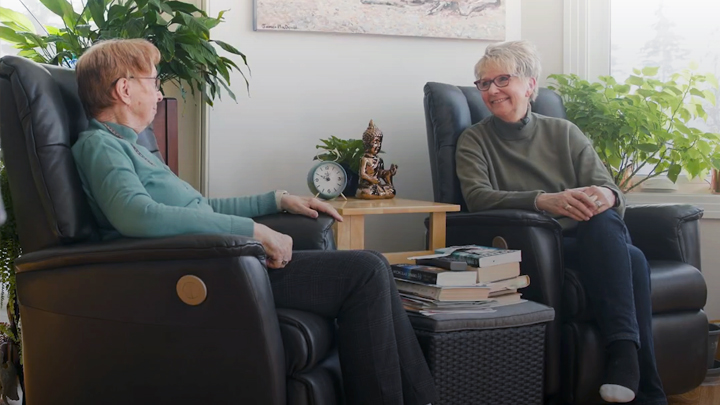
April 1, 2025

Joan Eales tells her daughter Jacquie how grateful she is to have her as a daughter and caregiver. Photo by Evan Isbister.
Story by Landis Reichle | Photo and video by Evan Isbister
EDMONTON — For many caregivers, their role starts after a loved one experiences a medical event. For Jacquie Eales, it was simply a piece of her mother’s future they had discussed and planned for years.
Jacquie and her mother Joan would talk about the future and where she could continue to live her best and healthiest life. As Joan lived in Victoria, it likely meant moving. After her second husband and their dog passed, there was little reason to stay in Victoria, so the pair put their plans in motion while Joan still had energy to make new friends and develop new routines.
Joan agreed to move to Edmonton by her 85th birthday to be close to most of her grandchildren and great-grandchildren, as she credits them as a reason to live a long life.
“With our respective backgrounds we've been able to have very frank conversations about what it means to grow older in a way that supports her well-being and her independence without exhausting me,” says Jacquie.
“You have to have somebody who's willing to be brave and look at their futures and imagine the possibilities — the what-ifs.”
What’s unique about these two is their combined 50-plus years of direct experience with seniors, continuing care, and family caregiving. Their extensive knowledge enabled them to prepare for Joan’s future. based on their understanding of the outcomes for seniors who don’t plan for their future aging selves.
By acknowledging Joan’s future and planning ahead, Jacquie was able to provide the care Joan needed when she fell and broke her foot in Edmonton. They were able to communicate if boundaries were being pushed, when too much was taken on, and how they could achieve a better balance in their relationship.
“It was a difficult experience, but we made it work,” adds Jacquie. “And I think the reason why we were able to make it work is because of our respective backgrounds. I know about the consequences of caregiving and how it can lead to burnout, and that's not what I want for me, and I know that's not what my mom wants for me.
“So I could say to her, ‘I can't do it, can we do it next week?’ or ‘I've got this amount of time that I can help you with something, what’s the most important thing you need done?’ I'm incredibly grateful that we can be so upfront and honest with each other, because I have other caregiving relationships, and that frankness is not there.”
Jacquie and Joan’s experience illustrates the importance of setting and respecting the caregiver’s boundaries to maintain your familial relationship.
One person cannot take responsibility for every aspect of their loved one’s life. It needs to be a team of supports — and the care recipient should take the lead for some of these decisions, if possible.
“I really try and be the daughter as much as I can, but I recognize that my role is more as a caregiver. I'm trying to straddle that relationship. It's not easy balancing the dual roles of caregiver and daughter.”
From Jacquie’s career and personal experiences as a caregiver, she hopes other caregivers will listen to their body and gut instincts, and be willing to respect those cues, to say ‘no’ to taking on more than they can handle.
And for care recipients, she encourages them to take control of decisions that impact them and do some work for themselves — “whether that be exercising, learning how to call an Uber, hiring somebody to help with meal preparation or take you out into the community once a week. (It’s important to) share the load and be grateful and reciprocate when you can.” Joan agrees it’s important she finds ways to support herself as well as her daughter.
“Whatever I can do to support her so she doesn't wear out, that's first and foremost. I would like to think I’ve minimized the wear and tear for her.
“I'm just so appreciative that my mom is so grateful and acknowledges the help that I provide,” adds Jacquie. “She came here to live and it's my goal to help her thrive. I'm excited to help her write the next chapter in her life.”
Caregivers can find resources, supports, and learnings at ahs.ca/caregivers.